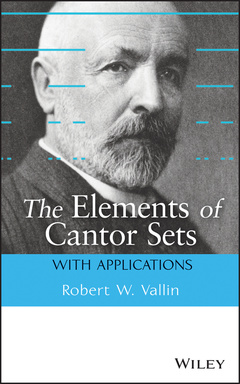The Elements of Cantor Sets With Applications
Auteur : Vallin Robert W.

A systematic and integrated approach to Cantor Sets and their applications to various branches of mathematics
The Elements of Cantor Sets: With Applications features a thorough introduction to Cantor Sets and applies these sets as a bridge between real analysis, probability, topology, and algebra.
The author fills a gap in the current literature by providing an introductory and integrated perspective, thereby preparing readers for further study and building a deeper understanding of analysis, topology, set theory, number theory, and algebra.
The Elements of Cantor Sets provides coverage of:
- Basic definitions and background theorems as well as comprehensive mathematical details
- A biography of Georg Ferdinand Ludwig Philipp Cantor, one of the most significant mathematicians of the last century
- Chapter coverage of fractals and self-similar sets, sums of Cantor Sets, the role of Cantor Sets in creating pathological functions, p-adic numbers, and several generalizations of Cantor Sets
- A wide spectrum of topics from measure theory to the Monty Hall Problem
An ideal text for courses in real analysis, topology, algebra, and set theory for undergraduate and graduate-level courses within mathematics, computer science, engineering, and physics departments, The Elements of Cantor Sets is also appropriate as a useful reference for researchers and secondary mathematics education majors.
Foreword xiii
Preface xv
Acknowledgments xvii
Introduction xix
1 A Quick Biography of Cantor 1
2 Basics 5
2.1 Review 5
Exercises 14
3 Introducing the Cantor Set 17
3.1 Some Definitions and Basics 17
3.2 Size of a Cantor Set 21
3.3 Large and Small 46
Exercises 48
4 Cantor Sets and Continued Fractions 51
4.1 Introducing Continued Fractions 52
4.2 Constructing a Cantor Set 59
4.3 Diophantine Equations 60
4.4 Miscellaneous 63
Exercises 65
5 p-adic Numbers and Valuations 67
5.1 Some Abstract Algebra 67
5.2 p-adic Numbers 72
5.3 p-adic Integers and Cantor Sets 80
5.4 p-adic Rational Numbers 82
Exercises 88
6 Self-Similar Objects 91
6.1 The Meaning of Self-Similar 91
6.2 Metric Spaces 92
6.3 Sequences in (S; d) 97
6.4 Affine Transformations 106
6.5 An Application for an IFS 112
Exercises 115
7 Various Notions of Dimension 117
7.1 Limit Supremum and Limit Infimum 117
7.2 Topological Dimension 121
7.3 Similarity Dimension 125
7.4 Box-Counting Dimension 126
7.5 Hausdorff Measure and Dimension 129
7.6 Miscellaneous Notions of Dimension 134
Exercises 138
8 Porosity and Thickness Looking
at the Gaps 141
8.1 The Porosity of a Set 141
8.2 Symmetric Sets and Symmetric Porosity 144
8.3 A New and Different Definition of Cantor Set 147
8.4 Thickness of a Cantor Set 148
8.5 Applying Thickness 149
8.6 A Bit More on Thickness 151
8.7 Porosity in a Metric Space 152
Exercises 154
9 Creating Pathological Functions via C 155
9.1 Sequences of Functions 155
9.2 The Cantor Function 159
9.3 Space-Filling Curves 165
9.4 Baire Class One Functions 169
9.5 Darboux Functions 171
9.6 Linearly Continuous Functions 175
Exercises 178
10 Generalizations and Applications 179
10.1 Generalizing Cantor Sets 179
10.2 Fat Cantor Sets 183
10.3 Sums of Cantor Sets 184
10.4 Differences of Cantor Sets 191
10.5 Products of Cantor Sets 193
10.6 Cantor Target 195
10.7 Ana Sets 196
10.8 Average Distance 199
10.9 Non-Averaging Sets 201
10.10 Cantor Series and Cantor Sets 203
10.11 Liouville Numbers and Irrationality Exponents 205
10.12 Sets of Sums of Convergent Alternating Series 207
10.13 The Monty Hall Problem 209
11 Epilogue 215
References 217
ROBERT W. VALLIN, PhD, is Professor of Mathematics at Slippery Rock University. The recipient of numerous grants and awards, Dr. Vallin is also the author of over forty journal articles and has given many undergraduate and research talks on a variety of topics.
Date de parution : 07-2013
Ouvrage de 256 p.
16.1x24.3 cm
Thèmes de The Elements of Cantor Sets :
Mots-clés :
Cantor sets, mathematics, real analysis, set theory, algebra, George Cantor, Ternary sets



